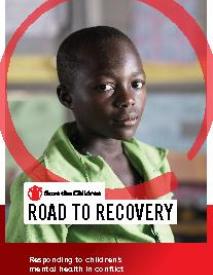Save the Children : Road to Recovery. Responding to children's mental health in conflict
The briefing paper sets out the scale of mental health effects on children living in conflict zones and the role of education in responding to them.
Latest figures reveal that 142 million children are living in high intensity conflict zones. As set out in the report and based on WHO analysis, Save the Children estimates that approximately 24 million of those children could be experiencing high levels of distress and have mild to moderate mental health disorders, needing an appropriate level of care. Despite this, child protection in emergencies, education in emergencies and Mental Health and Psychosocial Support (MHPSS) are critically underfunded. Save the Children analysis has found that as a proportion of Overseas Development Assistance, mental health and psychosocial support programming accounted for just 0.14% of spend between 2015-2017.
Children’s mental health can be impacted by conflict in various, overlapping ways – through direct exposure to violence conflict such as explosive weapons; the lack of access to basic services such as health, education and nutrition; the increased risk of violence in the home, at school and by peers; general insecurity, uncertainty and fear for the future; and the disruption conflict causes to children’s support networks and caregivers.
Responding to children’s mental health in conflict can and should be multisectoral and integrated. However, education – specifically Education Cannot Wait – offers one concrete opportunity for impact. Education facilities – such as schools and child friendly spaces – can provide children with access to supportive relationships with peers, teachers and community members, as well as a sense of stability. Access to education and children’s mental health are closely related, with this report including some of the ways education can support children’s mental health and wellbeing. Beyond providing a protective environment and contact with peers, education programmes can provide a space to deliver curriculum based interventions, such as social and emotional learning, and to equip appropriate adults with the skills, knowledge and tools to support children’s recovery.
Geachte bezoeker,
De informatie die u nu opvraagt, kan door psychotraumanet niet aan u worden getoond. Dit kan verschillende redenen hebben,
waarvan (bescherming van het) auteursrecht de meeste voorkomende is. Wanneer het mogelijk is om u door te verwijzen naar de bron
van deze informatie, dan ziet u hier onder een link naar die plek.
Als er geen link staat, kunt u contact opnemen met de bibliotheek,
die u verder op weg kan helpen.
Met vriendelijke groet,
Het psychotraumanet-team.
16 | London: The Save the Children Fundation
https://www.savethechildren.org/content/dam/usa/reports/emergency-response/road-to-recovery.pdf


